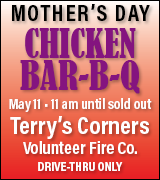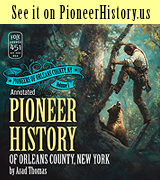Albion native writes book about town transformed into large hospital during Civil War
Kevin Pawlak, 23, highlights the sacrifice of a small town

“Shepherdstown in the Civil War: One Vast Confederate Hospital,” was released last month by The History Press. Kevin Pawlak will be signing copies of the book today at 2 p.m. at Bindings Bookstore, 28 West Bank St., Albion.
ALBION – An Albion native and Civil War history enthusiast has written his first book and it details the excruciating toll of the Civil War on a small town in West Virginia.
Kevin Pawlak, 23, earned his bachelor’s degree in Civil War history and historic preservation in 2014 from Shepherd University in West Virginia. That college is located in Shepherdstown, which is close to the Mason-Dixon line.
The community felt the painful toll of the war when marching armies arrived at their door in the summer of 1862.
The Maryland Campaign would bring thousands of wounded Confederates into the town’s homes, churches and warehouses. Pawlak writes how the town became a vast Confederate hospital, with 5,000 to 6,000 wounded soldiers cared for in homes, sheds and other buildings.
“It was the nearest town out of the way of the war,” said Pawlak, who works as education specialist with the Mosby Heritage Area Association in Virginia.
He said many small towns paid a heavy price in the Civil War. (The tower at Mount Albion Cemetery includes the names of 463 men from Orleans County who died in the war.)
Shepherdstown played the role of serving as a hospital for many maimed soldiers. Many did not survive and are buried in cemeteries at the town. Historical markers remain in the town, noting the community’s role as a caregiver in the summer of 1862.
“It’s the experience of a small town in the Civil War,” Pawlak said about the 180-page book. “You get a sense of the beauty, sacrifice and the pride they took in their country.”
Pawlak is the son of Jerome and Teresa Pawlak of Albion. He searched on-line for information, and visited depositories in Virginia and Maryland.
He highlights successes and failures that brought the battle close to Shepherdstown. He shares stories from soldiers, what they experienced in the war and how the community cared for them once they were in the vast hospital. He was able to find letters they wrote and mail sent to them.
“Researching the stories you get to know the soldiers,” Pawlak said. “They become more than a gravestone to me.”





































































